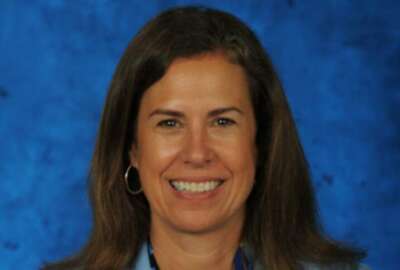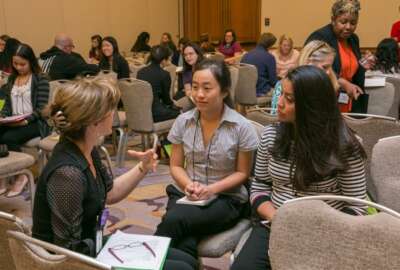VA helps women-owned small businesses get a slice of the federal contracting pie
The number of women veterans has been growing steadily over the years and so has the number of women veteran entrepreneurs.
Best listening experience is on Chrome, Firefox or Safari. Subscribe to Federal Drive’s daily audio interviews on Apple Podcasts or PodcastOne.
The number of women veterans has been growing steadily over the years and so has the number of women veteran entrepreneurs. The Department of Veterans Affairs helps these small companies get a piece of the federal contracting business with a new, 14-week course. For details, the Director of Woman Veteran-Owned Small Business Initiatives, Michelle Gardner-Ince, spoke to the Federal Drive with Tom Temin.
Interview transcript:
Tom Temin: Ms. Gardner-Ince, good to have you on.
Michelle Gardner-Ince: Likewise, thank you so honored.
Tom Temin: Tell us about this program. These are looking I guess at small companies that are women-veteran owned, that are not in federal contracting and want to get into it?
Michelle Gardner-Ince: Correct. These are women veterans, transitioning from the military, transitioning from other career areas, who are seeking to start with the end in mind, meaning they are starting their business with the intention of doing government contracting. And of course, the place that’s all about veterans is Department of Veteran Affairs.
Tom Temin: So you are trying to help them work not only for VA contracting, but they could apply the skills to any requirement that an agency might have.
Michelle Gardner-Ince: Correct.
Tom Temin: All right, so you developed a 14-week course here, tell us what’s in the course, how it gets delivered and some of the details.
Michelle Gardner-Ince: It’s very unique, because first of all, they got to go through various aspects from idea creation, market, determining what specific market or federal agency or product or service they wanted to offer. We went through finances, we went through government contracting, all the various aspects of building a business. But what makes this unique is this course was delivered by experts from inside the government and industry. So we basically met three times a week. Monday was basically coursework with four hours there. Then on Thursday, we would have support from women in defense, and the women business centers for D.C., Maryland and Virginia would provide a one-hour coaching. And then they had homework. And then we had what was like almost like a study hall on Friday, where they’d have counselors from the D.C., Maryland and Virginia women business centers, as well as the Department of Veteran Affairs on the mind to help them with their various homework, which ended up being a business plan and strategy at the end of the course.
Tom Temin: It sounds like you were trying to help them to understand that you just don’t call up a federal agency and mail in a bid. But this is a pretty arcane process, whether you’re a giant corporation, or a startup.
Michelle Gardner-Ince: That is so true. We really understood that taking them through this course, as a veteran woman community was very key, and that they feel safer in an all-female environment, learning, being vulnerable, showing their weaknesses, because many of these women, as you know are service-disabled veterans, and so they feel very comfortable and secure being supported by their sisters.
Tom Temin: And this all took place online, or was there some in-person components to it?
Michelle Gardner-Ince: No, it was all online. It started out with an idea between the director of the Women Business Center in Washington, D.C., and then we recruited the women business centers for Maryland and Virginia. So there’s about 2,000 women veteran-owned businesses in those three states.
Tom Temin: Wow. And how many participated in this, I guess, fair to call it a pilot issue of the course?
Michelle Gardner-Ince: Correct. It was a pilot. So we had about 60 women that started. There was an application process. We did send them through a series of questions. Every military service was represented except for the Coast Guard. And we even had a military spouse.
Tom Temin: Interesting. We’re speaking with Michelle Gardner-Ince, she’s director of Women Veteran[-Owned] Small Business Initiatives in the Office of Small and Disadvantaged Business Utilization at the Departmemt of Veterans Affairs. And did you have a range of types of businesses? I mentioned, most of the businesses are services businesses, information technology management-type of things. Are there any manufacturers in this cohort?
Michelle Gardner-Ince: There were not any manufacturers, but there were companies who provide veteran home care, senior veteran home care. There was construction, there were companies that provided trucking and logistics. There was company who does document – she works with what would be equivalent [of a] videographer documenting the stories of veterans and other businesses. So it did vary quite a bit.
Tom Temin: Are they all micro businesses, that is one or two people or were some of them maybe established with a couple of employees?
Michelle Gardner-Ince: There was a couple that were established. And what was amazing we asked them to share their successes at the end of the program, and 90% of them, were veteran certified, woman certified, as well as a couple of them that were more mature, but transitioning into government contracting received a couple of contracts during the period of the course, or the cohort.
Tom Temin: Because before you can even apply for a contract, you have to get into SAM, and you have to do a lot of paperwork, just establishing yourself as an entity. And I imagined the course dealt with that aspect of it, too.
Michelle Gardner-Ince: It did, we had the women certification program, and the veteran certification program brief them on their requirements. And they were supported by our Center for Verification and Evaluation helps certify them because they better understood exactly what they needed to do. And of course, we have counselors that help them along the way.
*Editor’s note: The Center for Verification and Evaluation will be transferred to the Small Business Administration effective Jan. 1, 2023. Read the FAQ about this transition here.
Tom Temin: And what kind of feedback did you get? That is to say, do you have information from the recipients of this information, ways you can tweak the course for the next time around?
Michelle Gardner-Ince: Absolutely. A couple of things they said is they want more time to interact, they want to build the community. Some of them, of course, thought the course was a little long. So as we go forward, in the next iteration, which will probably happen in the second half of the year, we will look at maybe doing some self study, and then shortening the actual, course length.
Tom Temin: Any results yet? Has anyone gotten the contract or applied for one that you’re aware of?
Michelle Gardner-Ince: Absolutely. About three of the company, we had 30 graduate. In fact, several of them have gotten contracts since the course started and concluded. So we’re very proud of that. And, it’s amazing because women veterans will be 20% of the veteran population by the year 2040. And half of all of the women that start businesses, many of them are women veterans and seem to be very successful and have a tendency to employ more veteran employees than nonveteran companies.
Tom Temin: And in your opinion, what’s the biggest barrier for women businesses, women veteran-owned businesses to getting that first federal contract?
Michelle Gardner-Ince: I think one, it is a focus, being very focused, narrowly focused on their particular market, their specific organization, their specific office, I think, is one. Two, I think it’s just access, access to information in an environment where they can feel comfortable learning, because if you grew up in a male-dominated arena, you have a tendency to be on guard and want to make sure that you don’t look vulnerable, and in a single gender environment seems to really work and the women business centers are the perfect place for that. And then the other thing is, I would say is just opportunity, very specific opportunities for women veteran-owned businesses is the wave of the future. They are the secret weapon, as far as I’m concerned, that this nation has yet to realize, because when you look at the amount of responsibility of the leadership expertise that we have, there’s nothing that we can’t do. We just need opportunity, access, information and environment to set us up for it.
Tom Temin: And when I hear you say it, I really believe it. I gotta tell you. And finally, what is your advice to agencies outside of VA to make sure that they themselves are creating the environment so that they don’t overlook this element of contracting opportunity?
Michelle Gardner-Ince: Great question. To companies outside of the government, I would say create specific opportunities. And when I say opportunities, I mean contract opportunities. And say, we’re going to develop an acquisition strategy to set aside these contracts to these caliber and types of women veteran-owned businesses. Inside the government, I would say the same. The challenge is we’re veteran first, not veteran only in the VA. So that was the catalyst of this program, is to bring women veterans and the veteran-first program together. So, within the VA and other federal agencies, we need a separate set aside category within the veteran category. And I know there’s some moves on that. I don’t know where it is, but that would be great. And then acquisition strategies: Hold these large companies accountable for setting aside and subcontracting to women veteran-owned businesses, because when we empower a woman veteran, we celebrate their service and we’re no longer invisible.
Tom Temin: And when does the next course take place?
Michelle Gardner-Ince: It will most likely be in the August-September timeframe.
Tom Temin: All right, we’ll be sure to make people sign up then. Michelle Gardner-Ince is director of Women Veteran[-Owned] Small Business Initiatives in the Office of Small and Disadvantaged Business Utilization at Veterans Affairs. Thanks so much for joining me.
Michelle Gardner-Ince: It’s been an honor thank you for showcasing women veterans, this nation’s secret weapon and national treasure.
Copyright © 2025 Federal News Network. All rights reserved. This website is not intended for users located within the European Economic Area.
Tom Temin is host of the Federal Drive and has been providing insight on federal technology and management issues for more than 30 years.
Follow @tteminWFED






